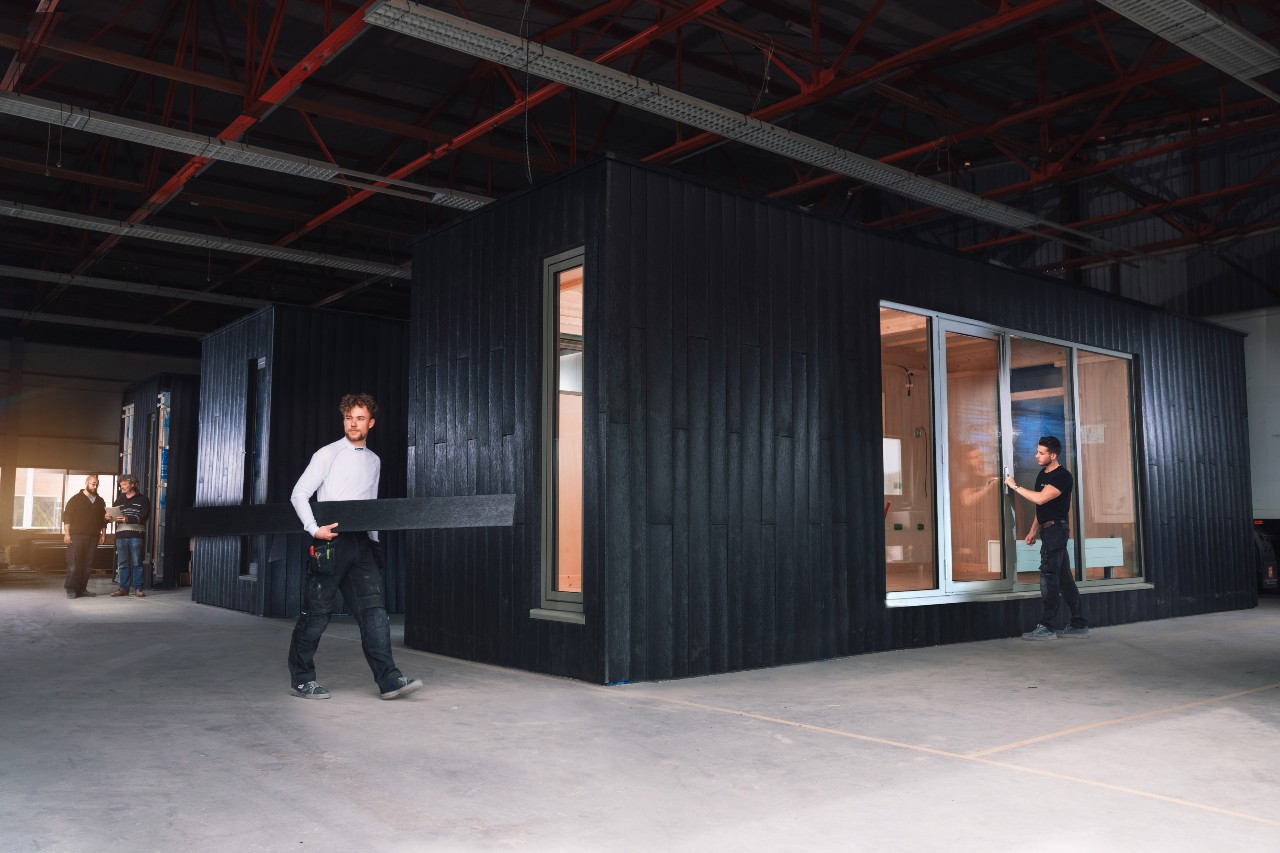Just a year ago, we opened the C2Homes factory. Our hall is now packed with tiny houses. But it causes mixed feelings. We are enormously proud, and at the same time there is still that one, ever-growing problem….
Let’s start with how proud we are.
Proud of our construction team, who managed to turn a paper concept into serious homes built from recycled plastic, wood and old jeans. (While all the way complying with legislation!). Proud of our partners who dared to step out of their habitual behaviour and join us in pioneering this sustainable, practical solution that has an impact on the environment, materials and people.
Together we have created a social enterprise, building homes for people who need them. We look back on that first year with tremendous satisfaction. Because…
We have already rescued tons of waste!
By building these modular homes, we rescue material from landfills and incinerators. Per house, we have now rescued about 6 tons of waste – the vast majority of which is waste plastic. Throwing it away is a waste, because you can build houses from it, right?
We build with a ‘material passport’
These houses are made to be easy to disassemble and to reuse the building materials for eternity (well, as long as possible…) We don’t glue walls but screw and staple them to limit material loss. For each house we note all the materials used in a ‘material passport’.
This not only gives us insight into which materials are in it and how we can reuse them. But also functions to calculate the ecological footprint. How, for example, does the material contribute to storage and transport and thus co2 emissions? In this way the houses are not only good for material and people, but also for the environment.
We now offer four people jobs based on motivation
We don’t just build houses to give people a home. We also build houses to offer people a place to participate in society. Everyone who wants to contribute is welcome. The tiny houses are designed in such a way that you don’t need any experience in construction or installation. For example, we use molds for everything instead of technical drawings and the installation work is a matter of plugging in.
We are inspired by the ‘Open Hiring’ principle (link in Dutch): we are not interested in your resume but in your motivation to come work for us. In this way, we also offer people with a distance to the labor market a chance to participate. Several people have already moved on from the youth program – building boats from waste plastic – to a paid job in the C2Homes factory.
We design creative solutions with big impact
Nothing in the tiny houses is without reason. In all sorts of details, we come up with creative solutions and ask ourselves: is this good for people, materials and the environment? And everything we come up with, we create ourselves. For example the shower trays for the bathrooms: we can just buy them. But we can also make them ourselves, from waste. We now have custom made sturdy black shower trays and sinks from recycled plastic boards, made by people whom we were able to offer a paid job. Win-win.
We have realized a circular business model
The missing link on the road to circularity, is the economic one: making money with a circular business. Often, companies actually see this as an increase in costs. We have established such a business ourselves, and demonstrated that you can build houses from waste at a very competitive price. And yes: come and copy it!
The homes have become a source of inspiration
Several times a week we have different kinds of organizations over to consider steps to make their own business more sustainable. But the real impact is made by all our partners who have committed themselves to this pilot project: they are pioneering along with us. Platform Westfriese Wooncorporaties (a local social housing company) for example, set itself firm goals regarding circular building – before our cooperation started. Ordering 16 houses as a pilot project is one of the steps they are taking in that direction. They know just as well: start small, but start today.
And last but not least: we now have a hall full of houses!
It’s been trial and error, a road of many challenges. But now that the construction team has passed the start-up fase, the pleasure of discomfort is coming to the surface. Because production is up to speed! We offer a quick solution to the housing shortage: building cottages on the assembly line. Eight houses are now ready for occupancy and we are building additional houses at tremendous speed.
And here is that one, BIG PROBLEM again:
By now we have become so adept at building these homes, that we have to slow ourselves down. After all, we are literally short on space because the cottages still do not have a residential destination and thus are ‘parked’ in the factory.
Despite the fact that every week we have council members, board members of both national and local governments, construction experts, housing associations, real estate magnates and all kinds of others over, eager to be inspired, and we offer an important solution to the housing shortage … it is doomed to fail.
Temporary housing. From waste. For people who are now desperate for a home. On residential land that is now waiting a long time to be built on. We build them with anyone who wants to participate, even if you have no experience in construction. You can’t be against that. And yet it is impossible to find a destination for them (link in Dutch).
Extremely slow decision-making
That ‘everyone is waiting for everyone’ attitude of central government and municipalities is bringing everything to a standstill. Don’t get us wrong: we know plenty of municipalities that are eager to place our tiny houses. But because of this incredible systemic thinking, we continually run into walls and extremely slow decision-making.
It’s a bloody shame.
Every municipality in this country faces an urgent task. There are plenty of people who do not have a home right now and are in a dire situation because of it. There are a hundred reasons to get into gear now. And yet there are eight houses waiting in our factory, unoccupied.
But you know us: we embrace the inconvenience and look at the pleasure it can bring us. Maybe giving those houses a residential destination ourselves, is a great guerilla marketing action for a new, sustainable living environment! Just keep a close eye on the media….

